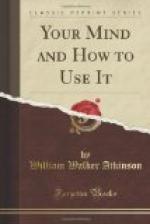A problem that may occasionally trouble a student is sleeplessness and we may properly consider here some of the ways of avoiding it. One prime cause of sleeplessness is external disturbance. The disturbance may be visual. Although it is ordinarily thought that if the eyes are closed, no visual disturbances can be sensed, nevertheless, as a matter of fact the eye-lids are not wholly opaque. Sight may be obtained through them, as you may prove by closing your eyes and moving your fingers before them. The lids transmit light to the retina and it is quite likely that you are frequently awakened by a beam of light falling upon your closed eye-lids. For this reason, one who is inclined to be wakeful should shut out from the bed-room all avenues whereby light may enter as a distraction.
The temperature sense is also a source of distraction in sleep, and it is a common experience to be awakened by extreme cold. The ears, too, may be the source of disturbance in sleep; for even though we are asleep, the tympanic membrane is always exposed to vibrations of air. In fact, stimuli are continually playing upon the sense-organs and are arousing nervous currents which try to break over the boundaries of sleep and impress themselves upon the brain.
For this reason, one who wishes to have untroubled sleep should remove all possible distractions.
But apart from external distractions, wakefulness may still be caused by distractions from within. Troublesome ideas may be present and persist in keeping one awake. This means that brain activity has been started and needs suppression. Various devices have been suggested. One is to eat something very light, just enough to draw the surplus blood, which excites the brain, away from the brain to the digestive tract. This advice should be taken with caution, however, for eating just before retiring may use up in digestion much of the energy needed in repairing the body, and may leave one greatly fatigued in the morning.
One way to relieve the mind of mental distractions is to fill it with non-worrisome, restful thoughts. Read something light, a restful essay or a non-exciting story, or poetry. Another device is to bathe the head in cold water so as to relieve congestion of blood in the brain. A tepid or warm bath is said to have a similar effect.




